|
|
Department of Political Affairs revamps UN Peacemaker
un article par United Nations Department of Political Affairs
The Department of Political Affairs recently
enhanced and re-launched UN Peacemaker, its online
mediation support tool, to meet the evolving needs
of mediation actors.

click on photo to enlarge
The upgraded version includes the largest on-line
database of peace agreements and allows users to
browse agreements by country and a wide array of
thematic issues. The website also provides
information on UN mediation support activities and
services and contains the UN Guidance for
Effective Mediation, including as a Mediationapp
for portable devices, allowing mediators to access
guidance material while they are on the go. The
whole package comes with a new look and feel.
UN Peacemaker was first launched in 2006 as part
of a broader initiative by the Department of
Political Affairs to professionalize further its
activities in mediation and provide accessible
knowledge and guidance to an expanding arena of
actors involved in conflict prevention, management
and resolution. At the center of these efforts
was the establishment of the Mediation Support
Unit, which provides operational support to
mediation, facilitation and dialogue processes and
manages the Standby Team of
Mediation Experts, who serve as on-call
advisers to UN and non-UN peace envoys. These and
other initiatives undertaken in recent years have
helped increase the dexterity of the Department
and its ability to engage in preventive diplomacy
and respond rapidly to crises.
Every conflict is unique and any peace process is
doomed to failure unless it responds to the
specific aspects of a crisis. Whether designing a
ceasefire or crafting agreements on power-sharing
or the management of natural resources, the
characteristics of each mediation process will
vary from setting to setting. But drawing on past
experiences can help mediators identify and
develop options for sustainable peace agreements
and warring parties to better envision the
possibilities of a peaceful resolution. UN
Peacemaker provides insights into reoccurring
factors that must be considered when building a
peacemaking strategy and provides quick access to
essential mediation tools. It has been widely used
by UN mediators as well as mediation actors at the
regional and national levels, including diplomats,
military personnel and civil society.
Want to know more?
UN Peacemaker: www.peacemaker.u
n.org.
Mediation support app: www.peacem
aker.un.org/mediationapp.
|








|
DISCUSSION
Question(s) liée(s) à cet article:
Can the UN help move the world toward a culture of peace?,
* * * * *
Commentaire le plus récent:
The following comes from my blog of October 2012
The United Nations and the Culture of Peace
My ten years working in the United Nations system left me with a sweet and sour taste: the sweet side was the universality of the UN, both its staff and mandate, and its great significance for raising the consciousness of the peoples of the world; the sour side was the jealousy of the Member States who make sure that the UN does not encroach on their freedom to rule over their own citizens, as well as people in other countries that they may dominate through neo-colonial relations. This became crystal-clear to me when the United States delegate, during the informal meetings of the UN General Assembly in 1999, opposed the Declaration and Programme of Action on a Culture of Peace, saying that it would make it more difficult for them to start a war. In fact, throughout history, war (call it “defense” if you prefer) has always been the most fundamental “right” of the state
With this in mind, I have been pleasantly surprised by the extent to which the UN system has once again taken up the culture of peace as a priority, as shown in this month's CPNN bulletin, just as it was a priority in the Year 2000 when I was the director of the UN International Year for the Culture of Peace
Of course, this does not happen by chance, and great credit belongs to two men who played key roles for the Year 2000, Federico Mayor Zaragoza, who made the culture of peace a priority of UNESCO, and Anwarul Chowdhury, who played the role of midwife at the UN General Assembly, guiding the culture of peace resolution through nine months of opposition by the powerful states. Once again, this last month, these two men motivated and spoke eloquently at the High Level Forum on a Culture of Peace at the UN
As always it was the countries of the South who supported the initiative (see the CPNN article of September 24 and its discussion), but at least this month it was not blocked by the powerful states
In fact, it is my impression that the powerful states pay less and less attention to the United Nations. When there was a financial crisis a few years ago, the powerful states did not turn to the UN agencies , the World Bank and the International Monetary Fund, but set up their own temporary system of finance ministers, and when it came time for the review of nuclear non-proliferation, President Obama held his own meeting with heads of state in Washington and ignored the UN conference where the only head of state to speak was that of Iran. And the US has pulled out of UNESCO entirely, forcing drastic cuts in its budget
In fact, the lack of attention by the powerful states may provide the UN system with an opportunity to push the agenda of the culture of peace without their opposition - let us hope that the UN can take advantage of this
Of course, in the long run, the UN, or any other institution, cannot mandate a culture of peace; instead, the culture of peace can only grow from the consciousness, both understanding and action, of the peoples of the world (see last month’s blog below). That’s why the role of the UN for consciousnes-raising is ultimately its greatest contribution!

|
|








